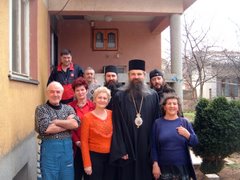Kosovo: False calm before the real storm?
By M. Bozinovich, Serbianna USAIn the immediate aftermath of the successful referendum in Serbia on its new constitution, the EU foreign Minister Javier Solana congratulated Belgrade on referendum's orderly conduct and suggested that it is an important step in aligning Serbian legal structure with that of the European Union whose membership Serbia covets. In Washington, likewise, there was an approval of the referendum, while both, the EU and US stressed that the Kosovo status process must go on and Serbia is obligated to accept the results of the negotiating process.
Solana's and Washington's favorable reaction to the Serbian constitutional referendum was immediately objected by Albania, Kosovo Albanians and the International Crisis Group.
Albania blasted the Serbian constitutional referendum as "unacceptable" because it complicates the diplomatic negotiation on Kosovo at a time when, presumably, the UN Security Council is suppose to vote on amputating Kosovo from Serbia, and Serbia, finally got itself a constitution that major powers recognize and will have to consider what it says for any decision making process.
Albanian President Alfred Moisiu then raised the specter of violence with a claim that in case the Serbian referendum complicated the decision on Kosovo and precludes its independence then such "postponement of the decision on the final status of Kosovo will activate the extremist forces in the two countries." The countries Moisiu was referring to that will turn violent and extremist is Albania and Kosovo.
Kosovo Albanians dutifully dismissed the referendum as "not deserving a comment" so that by keeping their silence, Kosovo Albanians endorsed Moisiu's threat of violence and thus escalated their hostility against Serbia with whom Kosovo shares the longest border in case it ever becomes independent.
The International Crisis Group, however, sought to produce, at least some, civilized evidence for this forlorn dud and join the ethnic Albanian political body in malevolent attacks of spite on the Serbian state. In it's media release titled Serbia's Constitutional Referendum: A Question Of Validity, the Group sought to delegitimize Serbian referendum by making claims that it has witnesses that saw mass voter fraud although the only authoritativeness of that press release may be the appearance of a colon in the title that imitates serious analysis.
So says the Group: "Witnesses and videotape evidence indicate that many voters were permitted not only to vote without providing photographic identification," writes the Group and adds that "entire referendum process was deliberately skewed in advance by the authorities."
That ethnic Albanian political leadership is, indeed, seriously upset by the Western endorsement of the new Serbian constitution was expressed by ICG’s Belgrade director, James Lyon, who roared in his blog on the web site of B92 with a Stalinist parody of the Serbian referendum.
Anywho…
Land-for-protection offer
The EU appears less alarmed by the ethnic Albanian threats of violence then Washington.
"The issue of the future status of Kosovo is a different matter that is being dealt with by [UN envoy] Martti Ahtisaari," said European Commission spokeswoman Krisztina Nagy and left the matter at that.
Washington, however, was quick to send its envoy Frank Wisner to Kosovo while some "unnamed" diplomats told the Kosovo Albanian newspaper Ekspres that UN is prepared to take away Serbian sovereignty over Kosovo but was not willing to grant full independence.
"Although the draft solution on the status of Kosovo, presented to the Contact Group by the mediator in the negotiations Martti Ahtisaari, does not contain the term independence, it provides for authorizations that could lead to conditional independence", wrote the daily citing some unnamed source who may have spoken in order to lay some ground work in advance of Frank Wisner's discussion with Kosovo Albanians.
Nevertheless, this is a significant development because it is the first time that, supposedly a Washington-based, unnamed source has altogether sidelined independence, unconditional and conditional, from the negotiating table.
In the past, this "unnamed" source close to the Contact Group was first promising an unconditional independence, then a "precisely worded" Security Council Resolution that will recognize Kosovo independence once some 13 criteria are met by Albanians, then rumors floated of a supervised independence and now the independence is sidelined altogether and replaced by administered sovereignty.
The point here is that there is a gradual and sustained reduction in the levels of independence that the Contact Group is offering to Kosovo Albanians and that for every reduction in the independence offer we have an escalation of independence rhetoric in the media in order to compensate for the anger the reduction may cause to the ethnic Albanian political leaders.
Exhausting All Independence Options
It then emerges that the deadline that Washington is chasing may be more for military reasons then for any practical matters of diplomacy that sound logic dictates.
"You need only three people, one landmine, one flag and a press communique to have an incident," says Macedonian Foreign Minister Antonio Milososki after talks with EU officials. Then he added that it is always best to take difficult decisions in the Balkans in winter before the snows melt and fighters can take to the mountains.
Since the Serbian army is mostly a mechanized mobile force that prefers to stay away from mountains, it follows that whatever the tough decision Contact Group makes, that decision will trigger Kosovo Albanian military reaction against the NATO troops on the ground.
It is perhaps this forward diplomatic knowledge of the effects of the actual decision that prompted NATO to sign military withdrawal rights through Serbia last year while using media to raise Kosovo Albanian expectations through the heavens not that they will ever be delivered but in order to tranquilize and perhaps set the most extremist elements of the Kosovo Albanian leadership in power and for a dramatic fall.
It is unlikely that the 1,100 US military personnel will institute the fall because they are there to stay. Recent beating of an American serviceman by Kosovo Albanians in a gas station demonstrates the precariousness of these troops that are afraid to even retaliate for that brutal beating although many know the names of these Kosovo Albanian drug-military gangsters that did the beating.
Before and if any military action breaks out in Kosovo, Washington appears to be engaged in a demonstration to the Kosovo Albanian leadership that it is willing to explore all diplomatic venues and thus exhaust all independence options. Given that independence is taken off the table, Washington has delinked sovereignty from independence and is publicly peddling that mantra.
Promising that he will press on the issue of an administered sovereignty with Belgrade, Wisner probably asked Kosovo Albanians in his recent visit for some additional token bargain that he could offer once he arrives in Belgrade.
According to a UPI report, once in Belgrade, Wisner said that in an independent Kosovo minority Serbs will be the best protected national group in the Balkans although, a wise diplomat that Wisner is, he should have known how ridiculous this "land-for-protection" offer sounds.
Wisner then proceeded to real business of reminding Serbia that status decision is near, a code word for urging Belgrade to quickly ratify the constitution because the idea of writing a new Serbian constitution suddenly became a paramount issue in Serbian politics only after Serbian President Tadic's visit to Washington in early October.
As the showdown on the decision on Kosovo status rapidly approaches the Security Council table, Washington and the British are also refining their promises to Kosovo Albanians arguing that, despite Russian and Chinese promises to veto independence, the Security Council will allow other states to recognize Kosovo Albanian independence.
“The Security Council would issue a mandate for a mission led by the European Union and invite individual countries to recognize Kosovo,” says said Anthony C. Welch of Britain, the coordinator of a review of Kosovo’s future security needs commissioned by the United Nations.
In other words, Kosovo Albanians are no longer promised any independence and, based on the track record of broken promises, a sane Kosovo Albanian politician now in power should not believe anything that the West is saying.
Instead of independence then, Washington and London are telling Kosovo Albanians that the Security Council will veto independence, that the EU will come in to rule Kosovo and perhaps, if they are good pets, individual countries may recognize them.
Will there be criteria for recognition? If so what is it? Is there a time line and if so what is it? Kosovo Albanians have no answer to any of these concrete questions yet they are blindly believing anything that Washington and the British promise to them.
According to a Reuters report, Agim Ceku expressed this blind trust in Western powers to grant Kosovo independence by the end of 2006.
“We trust the international community to drive this process through to the correct conclusion," Ceku said in a speech at Chatham House, the foreign policy think-tank, after meeting the British government on final status talks.
According to another unnamed senior European diplomat in the Kosovo capital Pristina the Security Council will offer Kosovo Albanians a solution proposal that only appears to have characters of independence but in reality, Kosovo Albanians will not get it.
“He doesn't mention independence but Ahtisaari is describing the criteria which characterise an independent country,’ the unnamed one said.
As a result of a Security Council deadlock, no independence but only promises, Kosovo Albanians would unilaterally declare independence and thus instigate a crisis with Serbia.
At that point, the Resolution 1244 would be suspended because it would be replaced with another. The language of the resolution that replaces the 1244 will dictate what happens after Kosovo Albanians unilaterally declare independence.

















